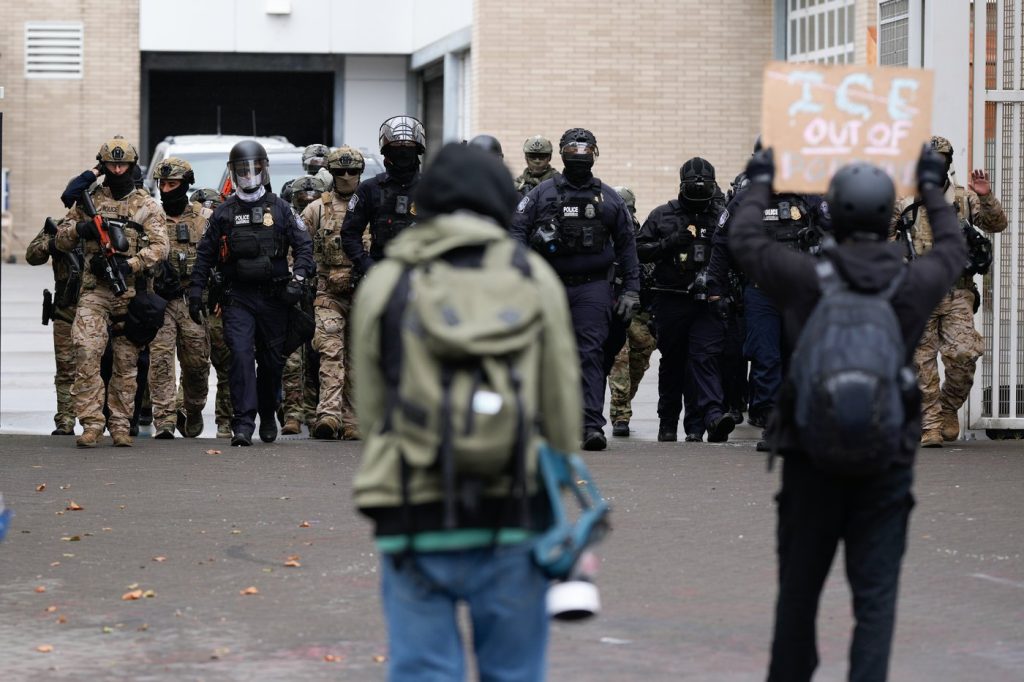A federal judge in Oregon ruled that the Trump administration did not meet the legal requirements for deploying the National Guard to Portland. This decision came after a lawsuit was filed by the city and state in September, challenging the deployment amidst ongoing protests at the U.S. Immigration and Customs Enforcement (ICE) building. U.S. District Court Judge Karin Immergut, a Trump appointee, presided over the case, which culminated in a three-day trial where both sides presented their arguments regarding the legality of military involvement in domestic protests.
The Trump administration claimed that the troops were necessary to safeguard federal personnel and property, describing Portland as "war-ravaged" with widespread chaos. In her 106-page opinion, Judge Immergut stated that while the president generally receives "great deference" in his decisions about the National Guard, he failed to establish a legal basis for deployment. Specifically, she noted that there was no evidence of rebellion or an inability to enforce the law using regular forces.
Judge Immergut emphasized that the protests, which occurred nightly from June to October 2025, remained largely peaceful following a few disruptive days in mid-June. She indicated that incidents of violence were isolated and did not significantly disrupt the execution of immigration laws. The judge criticized Trump's portrayal of Portland as "untethered to the facts," underlining the minimal interference from protesters to federal law enforcement.
Following the ruling, the Trump administration condemned the decision, asserting that it was made against a backdrop of ongoing violence. Abigail Jackson, a White House spokeswoman, reaffirmed Trump's commitment to addressing lawlessness in American cities and expressed confidence in being vindicated by a higher court. Meanwhile, Oregon Attorney General Dan Rayfield highlighted the importance of accountability to the truth and the rule of law, stating that the ruling protects the principle of fact-based legal application.
Democratic cities, including Chicago, have been actively resisting the administration's military involvement, arguing that the president has not met the legal threshold for troop deployment and that such actions violate state sovereignty. In early October, Judge Immergut issued two orders preventing the deployment of National Guard troops to Oregon, initially blocking 200 members from the Oregon National Guard and subsequently preventing troops from any state from being sent to Oregon to circumvent the first order.
The 9th U.S. Circuit Court of Appeals has already intervened, ordering a halt to the troop deployment pending further trial developments. The recent trial served to build a factual record that could influence future appellate rulings.
During the trial, witnesses, including local police and federal officials, were questioned about the law enforcement response to protests at the ICE facility. Although demonstrations peaked in June and were labeled a riot by Portland police, the protests dwindled significantly in the following months. Evidence presented by Portland and Oregon's attorneys indicated that police were capable of adequately handling the protests without federal intervention.
Attorneys for the defense pointed out that significant disruptions did not hinder the functionality of office operations. For instance, ICE employees worked from an alternate location during a three-week closure due to property damage. The circumstances underlined that the federal agency was still able to continue its operations effectively despite challenges.
This ruling by Judge Immergut may set a precedent for how future cases concerning the deployment of National Guard forces are adjudicated, particularly in the context of domestic protests.










